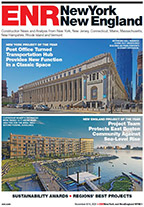A state court has ordered the New York State Dept. of Transportation to cancel an interchange upgrade project already under way and rebid the job because the agency violated competitive bidding laws by requiring compliance with a project labor agreement.
A state Supreme Court judge in Albany ruled that including the labor pact was illegal in this case and "tainted" the bidding process by its inclusion. The agency says in a statement that it is reviewing its options on the project "to maximize taxpayer dollars on this critically important transportation project." The agency halted all work on the project on March 5, an spokeswoman says.
At issue is a $72.4-million contract to upgrade Route 17 and the Exit 122 EB interchange in Orange County that was awarded to joint venture firm, A. Servidone/B. Anthony Construction Corp., Castleton, N.Y. The joint venture’s bid complied with the project agreement and was $4.5 million higher than the lowest bid.
The state DOT had originally advertised the project without a project labor requirement early last year with a March 24, 2011 bid deadline. However, the judge’s decision indicates that the Hudson Valley Building and Construction Trades Council proposed a project agreement for the job, and the New York State DOT ultimately approved.
In his ruling, Justice Joseph C. Teresi says that the agency failed to demonstrate that the decision to include compliance with the project agreement had "as its purpose and likely effect the advancement of the interests embodied in the competitive bidding statutes."
New York's DOT added a project labor requirement for the job 11 days prior to the bid date, says Mark Galasso, president of Lancaster Development Inc. Richmondville, N.Y., the low bidder. Lancaster stated that its bid would be without a project agreement requirement as the procurement initially stipulated, which caused the state DOT to reject the bid after opening, Galasso says. Lancaster sued the agency over the award.
"We had already prepared the bid," Galasso says. "But, last minute, they had a requirement of the job that the contractor who won the bid had to use union workforce." Had the agency's original advertisement indicated that the job required a PLA, "we would have been unable to bid it because, as an open shop contractor, it would force us to fire our entire workforce" and hire union workers, he says.
Galasso says that if the agency decides to accept the judge's ruling and rebid the job, his firm will submit a bid again. "That is all we were asking for in the first place,” he says. However, “if they decide to appeal, we will challenge the appeal."
Meanwhile, the A. Servidone/B. Anthony Construction joint venture team, which began construction on the job last October and reportedly has so far completed less than about 10% of the work, appears to be caught in the middle. "The joint venture bid the job as per the proposal set forth by the state Department of Transportation. There was only one way to bid," says Mark Servidone, president of A. Servidone Inc. "Our company followed the provisions of the bid proposal."
Servidone and his joint venture partner Bob Cavaliere, president of B. Anthony Construction, tell ENR New York that they are disappointed in the court’s decision and are evaluating an appeal.
"We also feel that we complied with contract documents and are being penalized for being prudent," Servidone says. He says the joint venture is waiting to see what the state DOT decides to do. "The [judge’s] decision is very fresh, and the agency hasn’t yet decided what direction to take," he says. "Our company hopes this unusual issue can be resolved amicably with the Department of Transportation."



